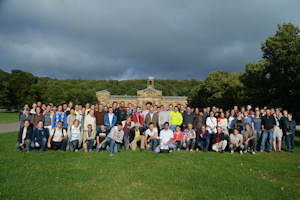Oct 31 2013
Manchester scientists working at the European Organisation for Nuclear Research (CERN) have reported the world’s most precise measurement of the difference between matter and antimatter – known as CP violation – during the decay of charm particles.
 Delegates at the Charm 2014 workshop held in Manchester in September
Delegates at the Charm 2014 workshop held in Manchester in September
The team, which included colleagues from the universities of Oxford and Glasgow, presented their findings at the sixth International Workshop for Charm Physics hosted by The University of Manchester’s School of Physics and Astronomy in September and have now submitted their publication[1].
Manchester scientist Dr Silvia Borghi, who presented the new result at the conference, said: “It is fantastic to be able to present our latest result at this conference. This measurement – the first to search for matter-antimatter asymmetries in charm particles with a precision of better than 0.1 per cent – is a major milestone for our group’s research.”
Professor Chris Parkes, co-chair of the conference, said: “This is an important topic of research at the Large Hadron Collider, as it provides a unique way to search for sources of new physics, and we were pleased to host this conference in the UK for the first time.”
The event, organised by members of Manchester’s High Energy Physics group who participate in CERN’s Large Hadron Collider Beauty (LHCb) experiment, is the leading conference for research in particles containing charm quarks.
The LHCb collaboration contributed a range of brand-new results, one of which was obtained under the leadership of Dr Marco Gersabeck, who was also co-chair of the conference. He said: “Attracting more than 100 delegates from around the world exceeded our expectations and shows the huge interest in this field. The results from the LHCb experiment are now shaping the world’s knowledge of charm physics.”
Dr Chris Thomas, from the University of Oxford, who also led one of the measurements for the new result, added: “The LHCb results are now driving the world precision in this area and these results are based on only one third of the data sample we have collected. The precision of these results allows us to search for new physics beyond the Standard Model.”
Mark Smith, a postgraduate student at The University of Manchester, was awarded the first prize in the conference poster competition for his work on the new measurement. He said: “This was an excellent opportunity to present my results, and I’m delighted to have been able to contribute to this major new result during my PhD research.”